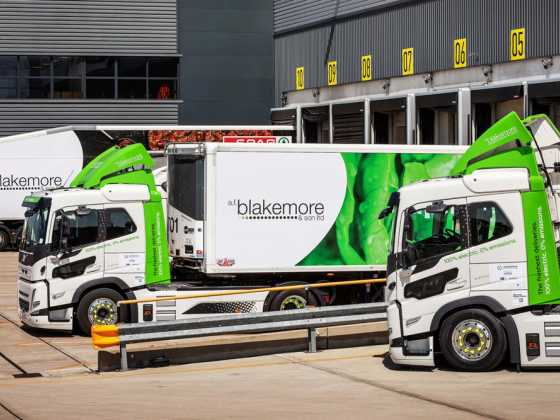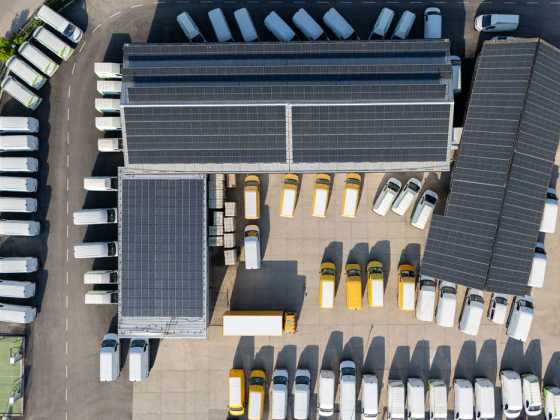An electric van fleet for British Gas
British Gas has shown its commitment to electric vehicles, taking on a fleet of Nissan e-NV200s following a successful trial during the winter of 2013.

This allowed the company to test the vehicles during the company’s busiest time of the year – and during the most challenging season for an electric vehicle. Energy giant British Gas serves around 11 million homes in Britain – nearly half the country’s homes – as well as providing energy to around half a million UK businesses.
The company has made a public commitment to have ten per cent of its 13,000 commercial fleet using electric vehicles by 2017. The company runs one of the largest fleets in the UK, and wants to take the lead to demonstrate how these vehicles can be successfully integrated into a busy and diverse fleet. British Gas is always working hard to reduce operational costs and carbon emissions, and believes that integrating electric vans into its fleets will help. British Gas expects that using electric vehicles will reduce its carbon emissions by 3,277 tonnes, or 7.3 per cent. This is based on having 10 per cent of our existing fleet running from electricity by the end of 2017.
In October 2013 British Gas, in partnership with Nissan and Hitachi Capital Vehicle Solutions set out on one of the UK’s largest commercial trials of electric vehicle technology. Using the Nissan e-NV200 fully electric van, 28 service and repair (boiler) engineers in Scotland (Glasgow), North East England and West London converted from their diesel Volkswagen Caddy to the low carbon vehicle for six months.
British Gas’ commitment to the environment, and the trial’s success, led to British Gas scooping Private Sector Fleet of the Year (medium to large), as well as Outstanding Achievement, at the 2014 GreenFleet Awards.
A comprehensive test
The trial looked to test a large number of vans across different locations, patch size, and inevitably in harder weather conditions. It also allowed British Gas to test the vans during its busiest time of the year – and it attended 200,000 more breakdowns in the winter of 2013/14 compared to 2012/13. These conditions meant it could robustly test if electric technology could be used by engineers with no impact on their working day, and to see if the total cost of ownership is comparable to a conventional vehicle.
A team from both Hitachi and Nissan supported the engineers during the trial, and looked at a variety of elements including installing a fast charger at the engineers home, looking at billing solutions to pay the engineers for the electric used, understanding how to train the engineer to recognise the dangers of high voltage electricity, and also how to maximise the range of the van using good driving practices, which differ highly to responsible and ‘green’ driving in a conventional vehicle.
Fleetmaster PLC and Gateshead College provided bespoke training to the drivers, which looked at charging the van, how to use eco modes and regenerative braking, and the technical features of the van. The training provided the engineer with a BTech level 2 in electric vehicle driving, and provided many of the engineers with confidence in using the new vehicles.
The vans completed in excess of 60,000 miles between them up until April 2014. Towards the end of the trial, all 28 engineers were invited to complete a feedback survey of the vehicles, and overwhelmingly the feedback was very positive. Engineers commented on the many user friendly features of the vans such as ‘automatic’ gearboxes (fixed drive, no gears), heated seats and steering wheels (in an effort to reduce the amount of cabin heating needed), and the same turning circle as a London taxi, making them incredibly manoeuvrable.
The only additional technology that British Gas added to the project were van trackers to monitor mileage and kWh per mile. Smart meters were also fitted at the engineer’s home to measure exactly how much energy the van was using in a certified and auditable manner.
Data to analyse
The trial provided a huge amount of data for the fleet team to analyse, with the two main focus areas being the operational performance of the vans, and the resulting total cost of ownership figure. This information allowed British Gas to decide the vans are suitable for everyday use, and how much the vans would cost the business to purchase, run maintain and sell onwards during its operational life. The team also compared this with the normal TCO figure of the fleet today. The trial was considered such a success that the team has made an initial order of 50 vans, with another 50 expected in early 2015. Ten trial vehicles are still in use today with engineers throughout the country, and a further five have been used as demos at engineer events so they can try the new technology.
Paul Kidd, a British Gas service & repair engineer from Northumberland, said: “I can sometimes spend hours each day driving between customer’s homes, but the Nissan e-NV200 made that just a little bit easier. It was smooth, stress-free and I was really disappointed when I had to give it back. I would absolutely recommend the van to other engineers, particularly as the technology improves and more charge points are installed. It’s definitely the future.”
Colin Marriott, general manager, fleet at British Gas said: “We have been extremely impressed with the performance of the Nissan e-NV200 during our winter trial. The feedback from our engineers speaks for itself, with the majority saying they would be happy to keep the van permanently.”
“Taking on 100 of these vehicles on a permanent basis demonstrates our continued commitment to leading the adoption of this technology amongst large vehicle fleets in the UK. With technology and infrastructure improving all the time, we look forward to expanding this number in the coming years.
Jim Wright, Nissan GB managing director, said: “The feedback we have received from the British gas engineers has been invaluable as it has ensured that the e-NV200 is well-suited to British road and business conditions and we have high expectations for its future and ongoing success.”
Jon Lawes, divisional managing director of Hitachi Capital Commercial Vehicle Solutions which managed the trial, added: “We have been closely monitoring and analysing the trial throughout the six months it has been running and have been delighted with the way the e-NV200 has performed. We fully expect to see a continued increase in the adoption of electric vehicles for commercial fleet operations, and the success of the British Gas trial provides compelling evidence to support business use of electric vehicles.”
Fleet Details
British Gas operates a 15,000 strong fleet comprising of 13,000 commercial vehicles (small to large vans under 3.5T) and 2,000 company cars. Because the business has many different aspects which may cover larger or smaller mileages, an annual mileage figure is difficult to calculate on a whole. However 12,000 miles a year per vehicle would be a good approximation.
Typical vehicles on British Gas’s fleet are: Volkswagen Caddy Maxi, Ford Transits and Vauxhall Vivaros. Its average CO2 figure for the fleet stands at company cars – 109 grams per Kilometre for Commercial vehicles – 3.75 tonnes of CO2 per year, per vehicle.
Environmental Impact
The environmental impacts of electric vehicle technology speaks for itself: zero tailpipe emissions. Even if the power for the vehicles came from fossil fuel power stations, they would still be far less CO2 intensive per mile than a comparative diesel powered vehicle.
In major cities (with London being a big target) particulates are a major consideration with electric vehicles emitting none. With the average British Gas van emitting 3.75 tonnes per year, the 10 that have been on fleet have saved 37.5 tonnes of CO2. Overall during this trial British Gas has saved 70.5 tonnes (approx). By mid-2015 British Gas will be saving 375 tonnes of CO2 per year with 100 electric vans. Ten per cent on electric by 2017 would represent a CO2 saving of 4875 tonnes per annum.
The electric vehicles represent a saving over their diesel counterparts, as long as they drive at least 10,000 miles a year, to pass the break even point. In London the cost savings could be as high as 20 per cent + with everywhere else representing about a six-ten per cent saving over diesel.
Communication
British Gas completed a number of communication activities with external stakeholders and staff to compliment the project. Over 68 news articles, publications and reports have been covered on the trial, and the van, with an estimated audience of 471, 055 views.
It has been internally advertised to different business units, to try and raise awareness for the new technology. There have also been demonstrations at engineer and manager meetings.
Representatives of the trial have also attended the 2014 commercial vehicle show and many national fleet events.
Partnerships
Hitachi Capital Vehicle Solutions have helped enormously in the management and running of the trial, and have been awarded the contract of leasing the first 100 electric vehicles to British Gas. Other parties include Nissan who have been very helpful during the trial period, offering pre production hand built vans (never before heard of by major motor manufacturers) and even changing aspects of the production version on from trial feedback. Finally Fleetmaster PLC have provided all the training and technical support for the engineers when receiving the vehicle.
The future of electric vans for British Gas looks very bright, thanks in part to more optimistic residual values, warranties and of course, lower vehicle costs than have ever been available thanks to battery mass production.
Further information
www.britishgas.co.uk






